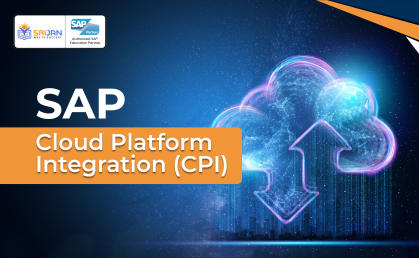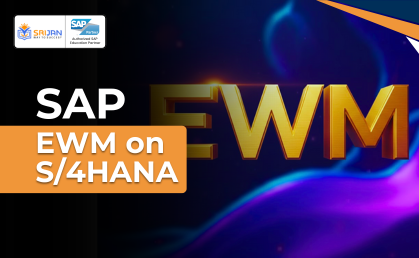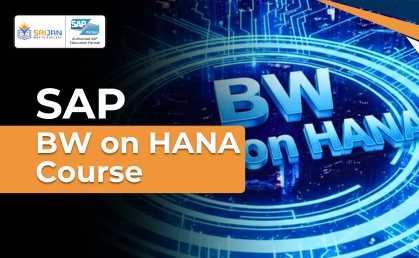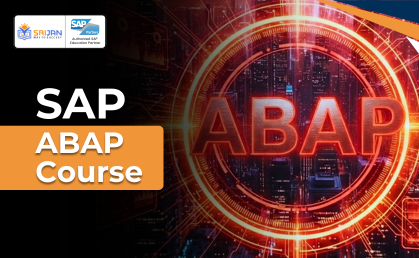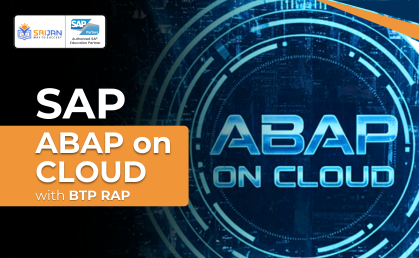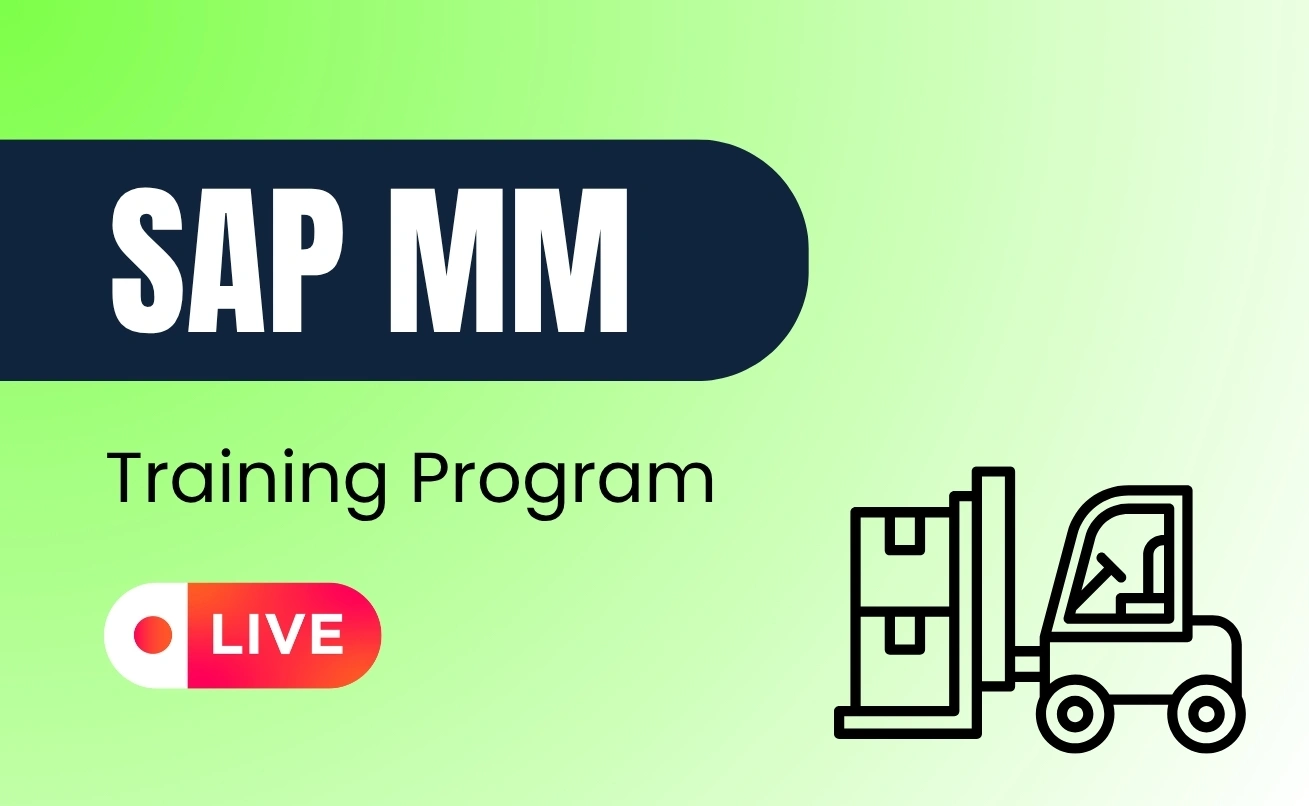If you want to start a career in the world of SAP, learning SAP MM courses online is one of the best choices. SAP MM (Material Management) is a very important part of SAP. It is used by companies to manage materials, stock, and purchases. In short, it helps businesses keep check of what they are buying, storing, and selling.
Srijan Institute gives a complete SAP MM online course that is made for students, freshers, and working experts. You don’t need to worry if you are new to SAP. The training is simple, step-by-step, and explained in an easy way so that anyone can learn.
Why Learn SAP MM online course?
Every company, whether big or small, needs to manage materials and stock properly. Without it, they may lose money or face delays in work. SAP MM helps businesses manage everything related to raw materials, finished products, and vendor payments. That’s why professionals with SAP MM knowledge are always in demand.
At Srijan Institute, we have created a complete SAP MM online course for students, freshers, and working professionals. The best part is that you don’t need to be from a technical background. Anyone can learn this if they are serious about making a career in SAP.
What will you learn in the SAP MM course?
The SAP MM course online at Srijan Institute covers all important topics. You will learn how materials are purchased, how invoices are created, how stock is updated in the system, and how reports are prepared. Slowly, you will understand the complete flow from buying a product to delivering it.
Some of the topics include:
- Basics of SAP and MM module
- Master Data (Material Master, Vendor Master)
- Procurement Process
- Inventory Management
- Invoice Verification
- Reports and Analytics
All these topics are explained in a practical way with examples so that you can practice and learn faster.
How Long Does It Take to Complete an SAP MM Online Course?
One important question is: How much time does it take to learn SAP MM? At Srijan Institute, the SAP MM course duration is usually 8 to 12 weeks. This depends on how much time you spend every day.
If you attend daily SAP MM online classes, you can complete it faster. If you are a working expert and can only spend a few hours per week, the speed will be slower, but you can still finish within 3 months.
The good part is that you can learn at your own speed. Since the classes are online, you can choose timings that match your routine.
Understand about SAP MM Course fees
When students think about learning SAP, they often ask about the SAP MM course fees. At Srijan Institute, we keep the fees affordable compared to many other institutes. We know that good education should be available to everyone, not just a few.
We understand the needs and requirements of all our customers, and keeping that in mind, we make sure our SAP MM course fees are competitive and the best in the market range. Learners can further take advantage of refund policies, and special discounts, so it is a safe and rewarding investment.
The SAP MM Course fees depends on the type of course you choose. For example:
- If you take recorded sessions, the cost is lower.
- If you join live interactive SAP MM online classes, the fees are slightly higher.
- If you want an SAP MM course online with placement, the fee may include career support and interview preparation.
We also provide flexible payment options to make it easier for students.
Join SAP MM Online Course with Placement support at Srijan Institute
One of the best reasons to join Srijan Institute is that we don’t just teach you and leave you. We also help you get a job. With our SAP MM course online with placement, you will receive full support after completing the training.
We guide you in preparing your CV, practicing for interviews, and applying to real companies. Many of our students have already been placed in top IT companies and MNCs.
This placement support makes the course more valuable because you don’t just learn skills – you also start your career.
Benefits of SAP MM Training Online
There are many benefits of learning SAP MM training online with Srijan Institute.
- First, you don’t need to travel anywhere. You can learn from the comfort of your home. This saves both time and money.
- Second, the classes are flexible. You can choose morning, evening, or weekend options according to your routine.
- Third, the training is practical. Instead of just theory, you will work on real-world scenarios. This makes you job-ready from day one.
- Fourth, you get access to study material. Even after completing the course, you can go back and revise whenever you want
SAP MM Course Duration Explained
The sap mm course duration is the perfect mix of detail and flexibility. Usually, students finish the course in about 8 - 10 weeks, depending on batch type and pace. Our weekday, weekend and fast-track courses are designed for your convenience, so that you can study at your own pace. Whether or not you’re working or a fresher, this timeline makes sure you are exam ready at the earliest without any delay.
- Standard Track:8–10 weeks of guided study with regular weekday classes.
- Weekend Flexibility: Special weekend batches for working professionals balancing jobs and study.
- Fast-Track Option: You can finish the sap mm course online with placement in as few as 4–6 weeks through intensive classes.
Career Opportunities After SAP MM Course
One of the main reasons students and professionals choose to learn SAP MM online is because of the strong career opportunities it offers. SAP MM professionals are in demand across almost every industry, since managing materials, stock, and vendors is a need for all businesses.
- SAP MM Consultant
You help companies set up and manage SAP MM in their systems. This is one of the most popular career paths. - SAP Procurement Specialist
In this role, you manage purchasing activities, vendor negotiations, and supplier contracts using SAP MM. - SAP Inventory Manager
Here, you make sure stock levels are updated, materials are tracked, and goods movements are recorded in SAP. - SAP Functional Analyst
As a business analyst, you connect the business needs with the SAP course online system and help companies work smoothly.
Companies across industries like manufacturing, IT, retail, and logistics hire SAP MM professionals. Since the demand is high, salaries are also good.
Freshers can expect a starting salary between 3 to 5 LPA, and with experience, it can go much higher.
Conclusion: Start Your SAP Journey with Srijan Institute
If you are serious about making a career in SAP, the SAP MM course online is the perfect starting point. It is simple, practical, and opens many job opportunities. At Srijan Institute, we make the journey easy with experienced trainers, flexible classes, affordable fees, and placement support.
Most importantly, Srijan Institute provides placement support so you don’t just finish the course and stop, but actually move forward into a career. Many of our students have already started working in top companies, and you can be one of them too.
To sum it up, if you want a career that is good, in demand, and has growth opportunities, learning SAP MM training online is the right step. With the right help, practice, and placement support from Srijan Institute, your SAP career journey can begin today.
The fee for SAP MM(Materials Management) training can vary depending on several factors such as the location, duration of the course, training format, and level of expertise. SAP offers various training options for MM, including instructor-led courses, e-learning courses, and virtual live classrooms.
For More details you can Register
SAP MM(Materials Management) Curriculum:
1. Introduction to SAP and SAP MM
- Overview of SAP and SAP MM
- SAP architecture and system landscape
- SAP MM module components and features
- Role of SAP MM in procurement and inventory management
2. Organizational Structures and Master Data
- Understanding organizational structures in SAP MM
- Creating and maintaining master data in SAP MM, including material master, vendor master, and purchasing info record
- Understanding the importance of accurate master data for effective procurement and inventory management
3. Procurement Processes
- Procurement process flow in SAP MM, including purchase requisition, request for quotation, purchase order, and goods receipt
- Creating purchase orders and managing purchase requisitions
- Goods receipt and invoice verification processes
- Document flow and integration with other SAP modules, such as FI and SD
4. Inventory Management
- Understanding inventory management in SAP MM
- Material movements and stock types
- Batch management and shelf-life expiration
- Inventory valuation and reporting
5. Pricing Procedure and Conditions
- Understanding pricing procedure and conditions in SAP MM
- Condition types, access sequences, and pricing procedures
- Configuration of pricing procedure and conditions
6. Release Procedure and Approval Processes
- Understanding release procedure and approval processes in SAP MM
- Release codes, release groups, and release strategies
- Approval workflows and notification settings
7. Material Requirements Planning (MRP)
- Overview of MRP in SAP MM
- MRP types and planning runs
- Exception messages and analysis
- Integration with other SAP modules, such as Production Planning (PP)
8. Physical Inventory Management
- Overview of physical inventory management in SAP MM
- Creating physical inventory documents and counting sheets
- Performing inventory counts and reconciling discrepancies
- Adjusting inventory quantities and valuation
9. Reporting and Analytics
- Standard reports and ad-hoc reporting in SAP MM
- Configuring and customizing reports
- Understanding SAP Business Intelligence (BI) and analytics tools
10. Integration with Other SAP Modules
- Integration with other SAP modules, such as FI, CO, SD, PP, and WM
- Understanding the impact of procurement and inventory management on other areas of the business
- Best practices for effective integration and collaboration between SAP modules
11. Batch Management and Serial Number Management
- Overview of batch management and serial number management in SAP MM
- Creating and managing batches and serial numbers
- Understanding the impact of batch management and serial number management on inventory valuation and reporting
12. Vendor Evaluation and Management
- Overview of vendor evaluation and management in SAP MM
- Creating and maintaining vendor evaluation criteria
- Evaluating and ranking vendors based on performance metrics
- Strategies for vendor management and optimization
13. Contract Management
- Overview of contract management in SAP MM
- Creating and managing contracts for procurement and services
- Release and approval workflows for contract management
- Contract analysis and reporting
14. Logistics Invoice Verification (LIV)
- Overview of logistics invoice verification (LIV) in SAP MM
- Creating and processing LIV documents
- Understanding the three-way match process and resolving discrepancies
- Configuring and customizing LIV workflows
15. Integration with Supply Chain Management (SCM)
- Overview of supply chain management (SCM) in SAP MM
- Integration with SCM modules such as Advanced Planning and Optimization (APO) and Supplier Relationship Management (SRM)
- Understanding the impact of SCM on procurement and inventory management
16. Advanced Reporting and Analytics
- Advanced reporting tools and analytics capabilities in SAP MM
- Data visualization and dashboard design
- Understanding SAP HANA and in-memory computing for advanced analytics
17. Best Practices and Optimization
- Best practices for optimizing procurement and inventory management in SAP MM
- Process improvement strategies and tools
- Continuous improvement methodologies and approaches
Note: The specific curriculum for SAP MM training may vary depending on the needs of the trainees/Corporate Client and the objectives of the training program.
SAP MM(Materials Management) Interview Questions & Answers:
1. What is SAP MM, and what are its main functions?
A: SAP MM is a module in the SAP ERP system that manages the procurement, inventory management, and material valuation processes of an organization. Its main functions include material master data management, purchasing, inventory management, and invoice verification.
2. What is a material master, and what information does it contain?
A: A material master is a central repository of information about a material or product that an organization uses in its business operations. It contains information such as material description, material type, unit of measure, pricing, and inventory data.
3. What is a purchase order, and what information does it contain?
A: A purchase order is a document sent by a buyer to a supplier to request goods or services. It contains information such as the type and quantity of goods or services, delivery date, pricing, and payment terms.
4. What is the difference between a goods receipt and a goods issue?
A: A goods receipt is a document created when goods are received into inventory, while a goods issue is a document created when goods are issued or consumed from inventory.
5. What is a purchase requisition, and how is it used in SAP MM?
A: A purchase requisition is a document that is created to request the procurement of materials or services. It is used in SAP MM to initiate the procurement process by creating a purchase order or a request for quotation.
6. How do you create a vendor master in SAP MM?
A: To create a vendor master in SAP MM, you can follow the following steps:
- Go to transaction code XK01 to create a new vendor master record
- Enter the vendor's name, address, contact details, and other relevant information
- Assign the vendor to the appropriate vendor account group and purchasing organization
- Save the vendor master record
7. What is a source determination, and how is it used in SAP MM?
A: Source determination is the process of identifying potential suppliers for a material or service. It is used in SAP MM to select the most appropriate vendor based on criteria such as price, quality, delivery time, and availability.
8. What is a stock transfer order, and how is it used in SAP MM?
A: A stock transfer order is a document used to transfer materials from one storage location to another within the same company code. It is used in SAP MM to manage stock transfers between different plants or warehouses.
9. What is the difference between a material type and a material group?
A: A material type is a classification that determines the attributes and behavior of a material, such as whether it is a finished product or a raw material. A material group is a classification that groups materials together based on their characteristics, such as the product category or supplier.
10. What is a pricing procedure, and how is it used in SAP MM?
A: A pricing procedure is a sequence of conditions used to calculate the price of a material or service. It is used in SAP MM to determine the price of a purchase order or invoice based on factors such as quantity, discounts, taxes, and surcharges.
11. What is a reservation, and how is it used in SAP MM?
A: A reservation is a document used to reserve materials for a specific purpose or use. It is used in SAP MM to ensure that materials are available when needed and to prevent them from being consumed or issued for other purposes.
12. What is the difference between a consignment and a standard purchase order?
A: In a consignment purchase order, the supplier retains ownership of the goods until they are consumed or sold, while in a standard purchase order, the buyer takes ownership of the goods upon receipt. In a consignment purchase order, the buyer only pays for the goods once they are consumed or sold, while in a standard purchase order, the buyer pays for the goods upon receipt.
13. What is the difference between a release procedure and a purchase order approval process?
A: A release procedure is a workflow process used to release or approve purchase orders based on certain criteria, such as the value of the purchase order or the material group. A purchase order approval process is a workflow process used to approve purchase orders based on the authority level of the approver, such as the budget or procurement authority.
14. What is the difference between a goods receipt and an invoice verification in SAP MM?
A: A goods receipt is a document created when goods are received into inventory, while an invoice verification is a process used to verify that the goods or services received match the purchase order and are invoiced correctly. Goods receipt and invoice verification are two separate processes in SAP MM, but they are closely related.
15. What is a source list, and how is it used in SAP MM?
A: A source list is a list of approved vendors for a material or service. It is used in SAP MM to ensure that materials are procured from approved vendors and to streamline the procurement process by reducing the need to search for new vendors.
16. What is a vendor evaluation, and how is it used in SAP MM?
A: A vendor evaluation is a process used to assess the performance of a vendor based on factors such as quality, delivery time, and cost. It is used in SAP MM to evaluate vendors and to identify opportunities for improvement in the procurement process.
17. What is a service entry sheet, and how is it used in SAP MM?
A: A service entry sheet is a document used to record services performed by a vendor. It is used in SAP MM to verify that the services have been performed as per the agreed-upon terms and conditions and to facilitate payment to the vendor.
18. What is the difference between a quota arrangement and a source list in SAP MM?
A: A quota arrangement is a way to allocate procurement quantities among multiple vendors based on predefined percentages, while a source list is a list of approved vendors for a material or service. A quota arrangement is used when there are multiple approved vendors for a material or service and the procurement quantities need to be allocated among them, while a source list is used to ensure that materials are procured from approved vendors.
19. What is the difference between a stock transfer order and a transfer posting in SAP MM?
A: A stock transfer order is a document used to transfer materials from one storage location to another within the same company code, while a transfer posting is a document used to transfer materials from one storage location to another within the same plant or company code. A stock transfer order is used when materials need to be transferred between different plants or warehouses, while a transfer posting is used when materials need to be transferred within the same plant or company code.
20. What is a purchase requisition, and how is it used in SAP MM?
A: A purchase requisition is a document used to request materials or services from a vendor. It is used in SAP MM to initiate the procurement process and to ensure that materials or services are available when needed.
Participants will have 24/7 access to our online lab, providing hands-on experience with SAP MM tools and scenarios.
This includes server access to S/4 HANA 2023 for 1 year, ensuring you have ample time to practice and apply your skills in a real-world environment.
With this extended access, you can work on projects, explore advanced features, and solidify your understanding of SAP MM in the latest SAP S/4 HANA version.
0
Satisfied Students0
Years of Excellence0
Practical TrainingCourse Certification
Upon successful completion of this course, you’ll receive a verified certificate recognizing your knowledge and achievements.
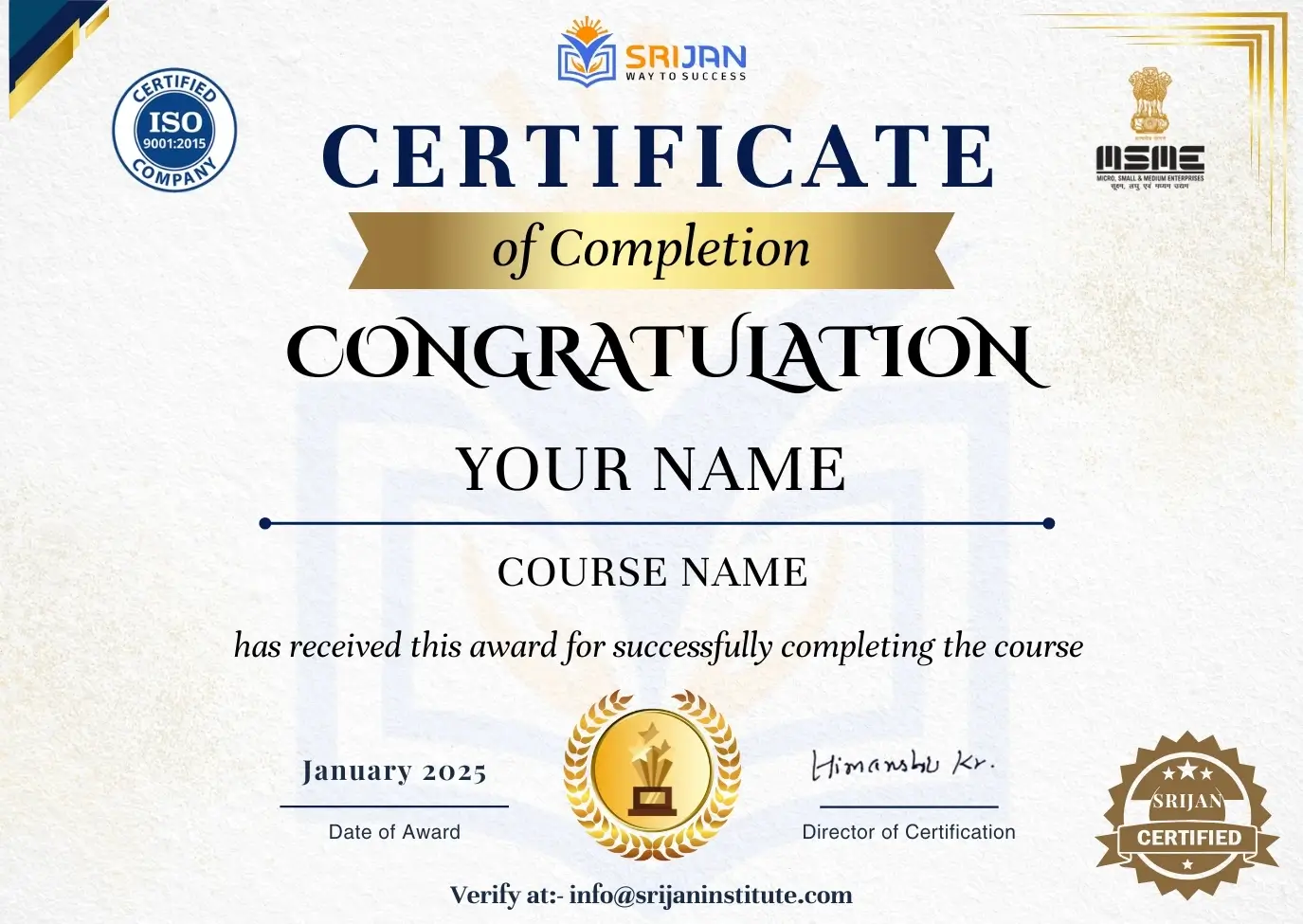
Our Hiring Partners
Our Popular Instructors
Meet our most talented and popular instructors

Mr. Manoj Pandey
SAP| MM| EWM|Ariba|erSAP Global Certified|SAP Consultant
- 12+ Years SAP Experience
- 6K+ Students Trained
- Real-Time Project Training

Mr. Amrit Raj
Full Stack SAP Developer CUM ABAP On HANA Trainer | SAP BTP Developer | Full Stack Developer | ERP & Data Science| SAP Global Certified
- 10+ Years SAP Experience
- 5k+ Students Trained
- Real-Time Project Training

Mr. Sudheer Sharma
SAP| FICO|Trainer|SAP Consultant
- 15+ Years SAP Experience
- 10k+ Students Trained
- Real-Time Project Training

Priyanshu Panday
SAP Basis and Security Consultant
- 4+ Years SAP Experience
- 2.5k+ Students Trained
- Real-Time Project Training

Buddhi Vishwas
SAP HCM | SAP SuccessFactors | Employee Central | RCM | PMGM | SAP Global Certified | SAP Consultant
- 8+ Years SAP Experience
- 3k+ Students Trained
- Real-Time Project Training
Choose Us
Why Choose Our SAP MM Course
-
01
Extensive Curriculum: Our SAP MM course includes in-depth coverage of procurement, inventory, and vendor management. We ensure our SAP MM module course is designed as per the official SAP certification.
-
02
Practical Training: The SAP MM full Course at Srijan Institute allows you to have real‑world experience under the guidance of experienced instructors through hands on projects. Case studies and simulations enable you to apply ideas directly to business practices.
-
03
Expert Instruction: Our certified SAP trainers break down the most complex MM processes into simple, easy-to-follow lessons. Their guidance will set you up for success in both certification & career growth.
Choose Your SAP MM Course Learning Plan
Pick the SAP MM Course batch that best fits your schedule—ongoing, upcoming, and recorded options.
On-Going Batch
- First Batch Start Date: 13th January 2026
- Second Batch Start Date: 27th January 2026
($608)
Upcoming Batch
- First Batch Start Date: 10th February 2026
- Second Batch Start Date: 24th February 2026
($608)
Learn At Your Own Pace
-
Enroll to access full recorded sessions, implementation notes, and completion certificate.
Self Paced Courses
Learn anytime, anywhere with our curated recorded courses
SAP MM Course FAQs
Yes, SAP MM Course is simple if taught step by step. At Srijan Institute, we use easy examples so even beginners can understand.
Yes, after completing the SAP MM Course with Srijan Institute helps in placement support, you can apply for jobs in top companies.
Freshers usually earn 3-5 LPA, while experienced consultants can earn 10-15 LPA or more.
Yes, we give free SAP MM training material PDF for practice and revision.
Level Up Your Skills with Our SAP MM Course Today!
Unlock Your Career Potential with Our SAP MM Course and Start Learning Today and Gain the Skills Employers Demand!




